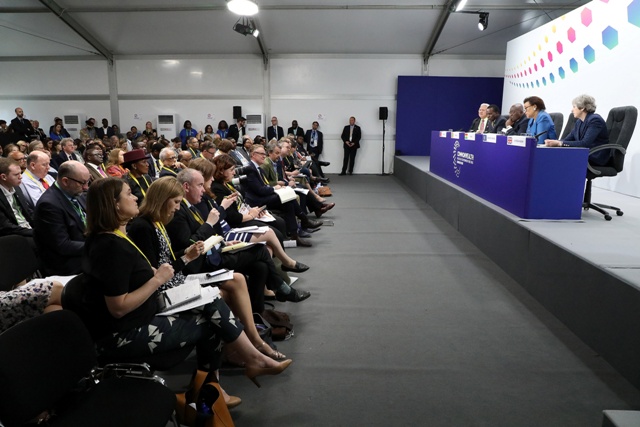
Journalists, Commonwealth Secretariat and CHOGM2018 organising officials filled the special Press Room One assigned for the final media briefing on Friday evening to find press releases on the achievements from the just-concluded Commonwealth Heads of Government (CHOGM) on our chairs.
The message was clear before host Prime Minister Theresa May and Commonwealth Secretary-General Patricia Scotland even walked into the marquee – the Commonwealth is still relevant and is providing concrete action beyond the words.
The documents waiting for us included the obvious communiqué, the leaders’ statement, a press release on trade and investment, a release on the stance against cybercrime, an updated observation guideline for Commonwealth elections, a release on leaders applauding the Commonwealth Blue Charter on ocean action and a joint Bloomberg Philanthropies/ Commonwealth release on proposals to explore joint initiatives in support of international trade, innovation and sustainability.
While we were digesting this avalanche of information, Prime Ministers Theresa May, Ghana’s Nana Akufo-Addo, Keith Mitchell of Grenada, Tuilaepa Aiono Sailele Malielegaoi of Samoa and Commonwealth Secretary-General Scotland entered and sat down at the head table.
Journalists play a newsroom/ news conference ‘word bingo’ game and it would have been too easy to have played this game with the use of the word “relevant” during this media briefing.
“The Commonwealth has found its voice and we can look forward to a bright future with confidence,” Prime Minister May told the room. On Commonwealth issues, the UK leader spoke about climate change, work on boosting Commonwealth trade and on Prince Charles as a “fitting” choice to succeed the Queen at Head of the Commonwealth.
View Prime Minister May’s comments at the closing media briefing:
On the more difficult issues, Prime Minister May offered the UK’s support for any Commonwealth country wanting to revamp its legislation discriminating against LGBT people and announced compensation for those affected by UK treatment of the so-called Windrush generation. Prime Minister May also announced that Rwanda will be the next CHOGM venue.
Video of the final day by the Commonwealth Secretariat:
Next, Patricia Scotland emphasised the needs of Commonwealth small states and the pressure for Caribbean states with 48 days to the next hurricane season. She outlined the first-ever Commonwealth Blue Charter project which had been the subject of a separate media briefing earlier in the week.
Patricia Scotland described the summit as “an extraordinary CHOGM” and said that the heads had asked for “concrete action on the ground”.
Ghana’s President Nana Akufo-Addo also spoke of “the continuing relevance of the Commonwealth” and a “very fruitful catalogue of decisions”, adding Ghana’s wish that the organisation address the needs of young people.
“The Commonwealth continues to be a relevant organisation,” he said.
Grenada’s Keith Mitchell said that this leaders summit had been one of the most productive he had attended with the largest group of heads.
On his priority topic of climate change, Dr Mitchell said that small states had “had enough of suffering from climate change when we are not the reasons for climate change”.
“Unless we implement the concrete steps, we will have continuous problems with our young people,” the Grenadian leader said.
Samoa’s Prime Minister Tuilaepa Aiono Sailele Malielegaoi also spoke of a “renewed interest” in the Commonwealth and a “renewed focus” to acknowledge the impact of climate change on small island states.
The journalists’ questions had a running thread – ‘Was the decision for Prince Charles to become the next head of the Commonwealth a unanimous one?’
The speakers mentioned ‘strong consensus’ and ‘support’ in response to various versions of this question, suggesting vigorous discussion by leaders on the issue. However, when the question was asked yet again in a different way, Prime Minister May said “the view was unanimous that Prince Charles should be the next Head of the Commonwealth”.
The on-trend message of delivery and ‘actions, not words’ continued to run through the leaders’ answers.
Back on the relevance message, Patricia Scotland spoke “a high level of specificity” in the Blue Charter as “we wanted to have real action on the ground”. She added: “the young people were our inspiration for us and they will give us a run for our money”.
Prime Minister May too spoke of “real concrete action”, Prime Minister Mitchell spoke of the “very special meeting that we’ve had”.
The leaders departed with their relevance message ringing in our ears.
As we left Press Room One, one of a series of marquees in the Marlborough House garden, our phones started to vibrate with electronic versions of the press releases, just in case we’d missed the point that the Commonwealth is putting words into action…and, of course, that it is more relevant than ever.
In the following hours, coverage of the close of CHOGM panned out in very different ways. India’s Prime Minister Narendra Modi’s office was already tweeting on Friday night of the Indian leader’s arrival in Germany for talks. The Australian media reflected questions on Prime Minister Malcolm Turnbull agreeing to Prince Charles as the next head of the Commonwealth. Social media and satirical cartoonists had fun with the Prince Charles succession.
Despite the pounding out of the Commonwealth message on the final summit day, there was also a run of articles over the post-CHOGM weekend questioning the Commonwealth’s legacy and relevance – a theme likely to preoccupy the organisation and Commonwealth watchers right through to CHOGM in Rwanda 2020.
Related articles:
Richard Bourne looks at the outcomes from CHOGM 2018
Victoria Schofield’s London Notes on CHOGM 2018
What the world’s media has been saying about CHOGM 2018
Follow Round Table on Twitter for updates on Commonwealth issues and analysis
Find out ore about The Round Table: The Commonwealth Journal of International Affairs



